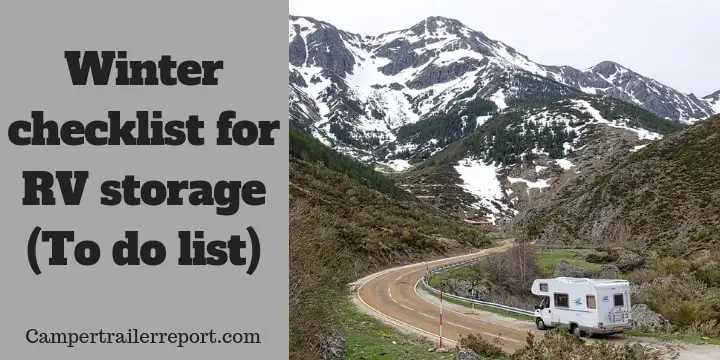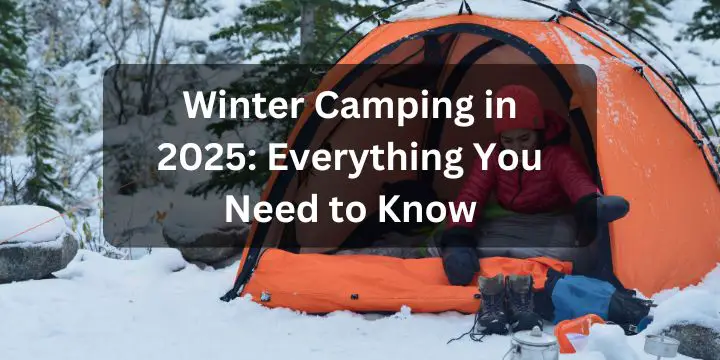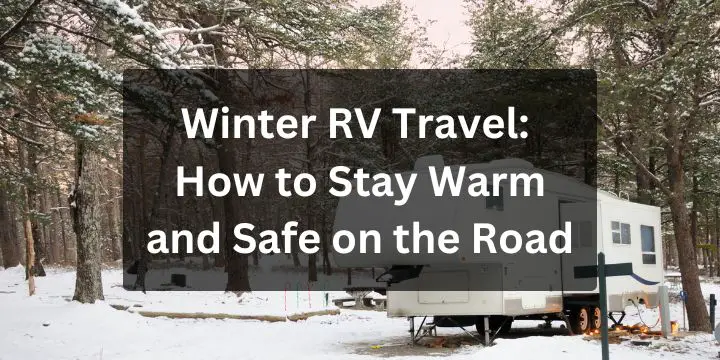Winter checklist for RV storage
First of all, wash your RV and clean its interior. Clean the fridge after defrosting the freezer. Put some baking soda in the compartments and keep the doors open.
Take out all dry cell batteries from devices like clocks and fire alarms. However, you may want to re-install the dry cell batteries when you take out your vehicle for the next season.
Check the body seams, roof seams, and sealants. Use proper sealants and seal the seams. Take out consumables that might attract mice and rodents. Turn off the LP gas.
Clean and dry out the awning fabric before storing it. Look out for areas from where mice and other rodents can get inside your RV. Use sealants to seal those areas.
Clean the filters of the air conditioner. Inspect and fill up the water levels in all of the lead-acid batteries. Store all the batteries after charging them.
The reason is a discharged battery will freeze out quickly. In case you’re storing your vehicle for a long time, remove the batteries and store them at a different place.
Change the oil of the generator and engine. Fill up the fuel tank and put a fuel stabilizer.
Make sure to run the generator as well as the engine long enough so that the stabilizer gets through the fueling system. Use a breathable cover for covering your RV. Also, cover the tires.
Put a piece of treated wood between the tires and the ground to prevent the tires from getting damaged due to the frozen ground.
Block the tires properly using tire blocks. Close the blinds of the windows to prevent sun exposure to the drapes, carpet, and upholstery. Keep doors, cabinets, and drawers open.
Have all locks serviced with a spray lubricant? Also, lubricate all hinges. Cover the vents of the LP gas appliance to ensure that insects don’t make their home in these vents.
Park your RV on a solid surface such as concrete or pavement. Damaged and/or frozen water lines can cause substantial damages to your RV.
Be sure to keep your vehicle from frozen temperatures. In case this is impossible, avoid parking your RV under trees or in tall grass fields.
Final words
Taking care of your RV during the winter season can be a chore. You need to pay attention to a lot of things to safeguard your vehicle from getting damaged.
However, you may ease this herculean chore by acting smartly. Just stick to the above RV winter storage checklist. Aside from protecting your RV from undesirable damages, you’ll have your RV ready when the camping season begins.
> You may also like:First Time Travel Trailer Owner Tips,Beginner’s Guide. <<
RV Related Questions:
Should RV be covered for winter?
According to approaches for maintaining your RV device, it is vital to adhere to the basic maintenance practices when handling it.
Cold temperatures may ultimately deter the experience and function of an RV. Negligence of protecting the vehicle during winter can result in costly expenses and damages during repair.
However, this can be evaded by covering the RV by using covers form either Camco or ADCO manufactures. There are various guidelines however to observe during this process. They include
- Ensuring the exterior of your RV is dry
- Fully sheltering every corner or side of your vehicle
- Protecting the vehicle’s antennas, as well as allowing air circulation within the vehicle using roof vents.
How do you store an RV for the winter?
Winter as known does not work well with electrical machines for reasons known. As a result, it is advisable for homeowners with RVs to invest in a rental RV storage in which they can house their machines. Although pricy, this will ensure that your RV is safe and protected from the harsh cold climate. Owners may also research through Sparefoot to find convenient storage units for their RVs.
How do you insulate a camper for the winter?
The cold winter temperatures can be such a hustle for campers using RVs; this is because the metallic framework of the vehicle absorbs moisture and holds the temperature inside the vehicle. Nevertheless, this moisture control can be regulated by opening roof vents to allow constant circulation. Just a little opening would help in this case. In addition, in order to warm up the environment inside the vehicle, campers may opt to insulate the skirting by means of rigid insulation. This helps to heat up the area within the RV and prevent the machine from freezing.
How do you keep RV pipes from freezing when camping?
Unfortunately, freezing of RV pipes is very prone during winter. Nonetheless, every RV owner should be prepared during such times. This is done by ensuring that campers fill up their fresh water tanks in the vehicles and store away the pipes and hoses. Moreover, a camper should create room for wastage in the RV pipes by emptying their black and gray water tanks while securing its valves from water wastage.
Is it bad to leave your RV plugged in all the time?
No, this is not bad at all. Plugging your RV at any time is a personal choice. However, it is essential to confirm and monitor the battery life of the machine so that the RV does not get damaged or stop to function.
Will my RV pipes freeze?
Freezing of these pipes is possible. However, the water passing through the pipes cannot freeze when the RV is well insulated. Ensuring that there is constant heat within the vehicle is necessary although not extremely high temperatures as it may manipulate the machine. Just an average of 50 degrees is enough to maintain and prevent the pipes from freezing.
> You may also like:45 RV Accessory Must-Haves for Your Travel Trailer<<


